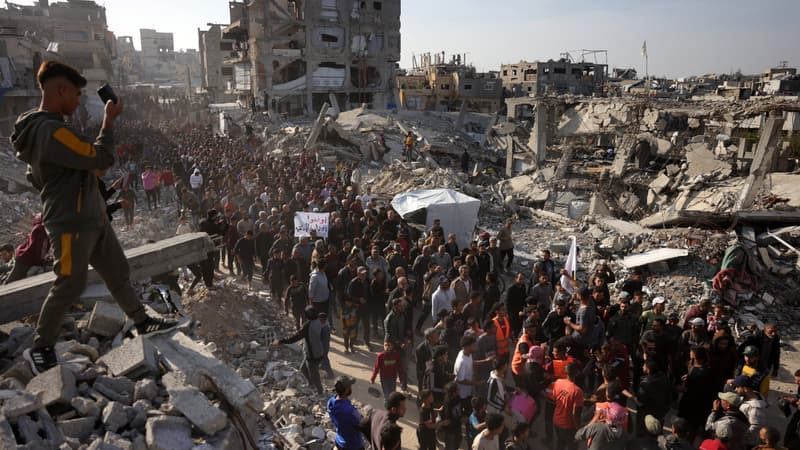“Hamas outside, outside.” For almost a month, several hundred Palestinians have been organizing sporadic manifestations in the Gaza Strip to protest against Hamas. They consider in particular that the Islamist movement, which has been in hand in the enclave since 2007, is responsible for the disastrous situation in which they live today.
They call at the end of the war with Israel, launched on October 7, 2023 after the unprecedented attack in Hamas in the Hebrew territory.
During a demonstration in Beit Lahia, in the north of the enclave this Wednesday, April 16, the Palestinians sang anti-break slogans, such as “Hamas outside” or “Hamas, is slag,” Abu Ismaïl Wachah, a 45-year-old resident, who participated in the rally, told AFP.
The latter explained to support “any action that requires the end of the war, because today they live besieged, amid destruction, and suffer permanently.”
“These manifestations are not a surprise”
Breaking a truce of almost two months, Israel resumed its offensive on March 18 at the Gaza Strip. At least 22 people, including six members of the same family, were killed in new bombings this morning on Thursday, April 24, according to the Palestinian civil defense.
In total, since October 7, almost 2.4 million people have been transferred at least once in Gaza and 51,305 people died according to the Hamas Ministry of Health.
Despite his victory in the surveys in 2007, “Hamas was never hegemonic and has never gathered 95% of the votes in Gaza. There have always been opposite currents to Hamas,” says Pierre Berthelot, a professor of geopolitics and specialist in the Middle East in Atlantic media. “These demonstrations and these protest movements in Gaza are not completely a surprise.”
For that, these events are “logical” to the extent that the “confrontation strategy” of Hamas with Israel “led to the quasi-disorder of the territory in Gaza.”
“The question now is to know to what extent these people opposed to Hamas can weigh to offer an alternative to this movement,” he added.
“We want to live in freedom”
In the smelling signs by the protesters, we can read “Hamas does not represent me.” “The world thinks that Gaza is Hamas and that Hamas is Gaza,” Moumes Al-Vatour, Gazaui’s lawyer and former political prisoner who wrote a column in the Washington Post, told BBC.
“We have not chosen Hamas, and now Hamas is determined to lead Gaza and link our destiny with his. Hamas must retire,” he added.
Mohammed al-Masri, another demonstrator, explained that the crowd expressed his fed up “in the face of destruction, incessant bombings and repeated evacuation orders” of the Israeli army.
“We do not want a Qatar tent, we want to live in freedom,” he said, referring to the tents of the hundreds of thousands of displaced people from the Palestinian territory besieged by Israel since the beginning of the war.
Since the failure of the cease cessation negotiations in early March, Israel has prevented Gaza humanitarian aid entry aggravating the humanitarian crisis.
“We live in the 21st century and we are deprived of the most basic human rights. We cannot even get a piece of bread,” said Dawood Zayed, a resident of Beit Lahia to AFP. “We want to live a simple life, in freedom and dignity, and not see that our children and our parents die before our eyes due to lack of treatments and hospitals.”
Hassan Abu Jarad, meanwhile, asked the “wise men of (their) people” the immediate “liberation” of the Israeli hostages. “War must stop and hostages must be released. There will be no more hostility, way of life and sharing,” he added. Of the 251 people kidnapped on October 7, 58 are still hostage in Gaza, 34 of which they died, according to the Israeli army.
“We have to risk and talk”
The Israeli-American writer, Ahmed Foud Alkhati, asked X this Saturday, April 19 to “amplify the anti-Ahamas and Pro-Paix Palestinian voices in Gaza.” “Anti-Ahamas manifestations can become and become a regular event,” he said.
However, manifesting can be dangerous for the Palestinians, Hamas Little Prospering Dissent.
At the end of March, Oday Al-Rubai, 22, who had participated in Anti-Ahamas demonstrations, was kidnapped by armed men in a refugee shelter in the city of Gaza, reports the BBC. It was found dead. According to the Palestine Commission, regardless of human rights, the young man was tortured, and his death represents a “serious violation of the right to life and extrajudicial execution.”
Another member of the protest movement, Amin Abed, was beaten by masked men until he lost knowledge, according to the BBC. Since Neat in Dubai, he has the impression that Hamas’ power has begun to weaken. “
“He addresses activists and civilians, hits them and kills them to scare people. But it is no longer as before,” he says.
In fact, according to the specialist Pierre Berthelot, “some independent studies suggest that Hamas has lost popularity in Gaza.” “We have to risk and talk,” said lawyer Gazaui, Moumes al-Vatour. “I am 30 years old. When Hamas took power, I was 11 years old. (…) I lost my life between war and the escalation of violence for nothing.”
Source: BFM TV


